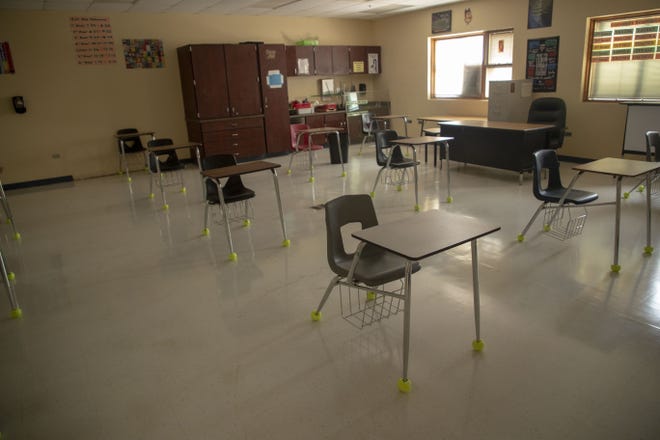A new effort to provide high-speed internet to people with relatively low incomes or who live on Native American lands could especially benefit Arizona, which has lagged behind some neighboring states for such internet access.
President Biden on Monday announced commitments from 20 communications companies, which include several operating in Arizona, to limit internet bills to $30 a month for some eligible households.
The price-limiting commitments are a new wrinkle to Biden’s internet push that was part of the White House-backed infrastructure bill passed by Congress and signed into law late last year.
More than 1,300 internet service providers already participate in that program, called the “Affordable Connectivity Program,” and more than 11.5 million households have signed up for it.
That legislation allows various low-income families to receive up to a $30 discount on high-speed broadband service, or up to $75 for households on tribal lands. Combining the new commitments from the 20 providers means some customers will qualify for free high-speed service.
“The Biden-Harris Administration has secured commitments from 20 leading internet providers to offer ACP-eligible households a high-speed internet plan for no more than $30 per month,” the White House said. Eligible families who pair the program benefit with one of these plans can receive high-speed internet at no cost.
In other words, a $30 discount on a bill of $30 equals free service, according to the White House. Adding various service features could push up bills above that.
“High-speed internet is not a luxury any longer. It’s a necessity,” Biden said on Monday. The new and prior discounts and expanded access will “change people’s lives.”
Here are answers to some questions that might arise about the program:
Which companies are involved?
Twenty providers agreed to it, including higher-profile entities AT&T, Cox Communications and Verizon. The providers have committed either to increase speeds or cut prices, “making sure they all offer ACP-eligible households high-speed, high-quality internet plans for no more than $30/month,” according to the White House.
Internet during COVID-19: Arizona schools are going digital during coronavirus. Some students will be shut out.
“We never want the income challenges of a family or individual to be a barrier for households having a reliable high-speed internet service,” said Percy Kirk, a senior vice president and Southwest region manager of Cox Communications, in a prepared statement.
“Our commitment to digital equity continues to be our guiding purpose and by participating in ACP, we can reach more low-income students and households in Arizona.”
Who’s eligible for discounts?
The White House said about 48 million households, or nearly 40% of the total, are eligible for the Affordable Connectivity Program announced last fall. The commitments from the 20 providers will cover about 80% of the households in those programs.
People with low incomes can qualify. Specifically, households with annual incomes at or below 200% of the federal poverty level — about $27,000 for an individual or $55,000 for a family of four — are eligible, according to the GetInternet.gov website. Families also may qualify if they are enrolled for various programs such as Pell Grants, Medicaid, Supplemental Security Income and SNAP or the Supplemental Nutrition Assistance Program.
The GetInternet.gov website provides more details and lists participating providers.
Many agencies that run these programs, as well as various nonprofit groups, are planning to reach out to the people they work with or already have done so. More than 1,300 internet service providers participate in the program, and more than 11.5 million households have signed up to receive monthly discounts of up to $30 or $75.
What are the government’s costs?
The internet provisions approved in the infrastructure legislation last fall, including the connectivity program features, are expected to cost the federal government about $65 billion, down from the $100 billion that Biden requested. The total legislation, which also provides funding for roads, bridges, water programs, energy systems and more, is pegged at $1.2 trillion.
Are there other program wrinkles?

And it is. For example, upcoming rules will require providers to display program features and costs in a standardized way so that consumers can comparison shop for the best internet deals. Also, the Federal Communications Commission has adopted rules preventing deals between providers and landlords that restrict internet options to the millions of Americans who live in apartment buildings.
In addition, eligible households may qualify to receive a one-time discount of up to $100 to buy a laptop, desktop or tablet computer from certain participating providers. Interested households can contact their providers to inquire about this discount.
How is Arizona positioned?
Arizona stands to benefit from some of these changes. A 2018 broadband study from the state Department of Administration estimated only 78% of Arizonans had internet in their homes back then.
The nearly 900,000 residents lacking coverage were largely concentrated in tribal areas and other rural parts of the state, with few service providers in some areas.
Gov. Doug Ducey views broader coverage and participation as essential to helping more Arizonans improve their educational attainments and in providing better security protections, such as through the wearing of body cameras by police, better gunshot monitoring and license-plate reading capabilities.
It’s also a factor that could dim Arizona’s economic development, the report argued, as both Utah and Nevada, for example, had coverage rates above 90% back then.
How fast is high-speed service?
For the federal programs, the Biden Administration defines high-speed services as those with download speeds of at least 100 Megabits per second everywhere that a provider’s infrastructure can handle it. That’s sufficient to allow a typical family of four to “work from home, do schoolwork, browse the web and stream high-definition shows and movies,” the White House said.
Reach the reporter at [email protected].
Support local journalism. Subscribe to azcentral.com today.
